St Kilda legend Nicky Winmar inducted into Australian Football Hall of Fame
Nicky Winmar was and is so much more than a footballer, Mark Robinson writes on the St Kilda great’s induction into the Australian Football Hall of Fame.
AFL
Don't miss out on the headlines from AFL. Followed categories will be added to My News.
Neil Elvis Winmar — who everyone calls Nicky — has such a cheeky streak, you don’t always know if he’s gagging or not.
An exquisite and near flawless exponent of every skill of Australian rules — which is kicking, running, marking and tackling — Winmar says he learnt his craft in the backyards, paddocks and shearing sheds in his home town of Pingelly, 160km southwest of Perth.
CLICK FOR MORE ON THE HALL OF FAME INDUCTEES
Such earthy terrains belies a graceful quality which Winmar carried through a remarkable and sometimes turbulent career at South Fremantle, St Kilda and his one season at the Western Bulldogs.
Watch every blockbuster AFL match this weekend Live & Ad-Break Free In-Play on Kayo. New to Kayo? Try 14-Days Free Now >
Winmar was a beautiful, classical player, even way back when in Pingelly.
“As a kid, every day we played the game,’’ Winmar said.
“Everyone gathers every Sunday to play sport. We started in E grade for the youngest ones, I think the under-7s, to D grade which I think was under-11s. The C grade was under-15s and B grade was a mixture of kids and a lot of guys with hangovers from the night before.’’
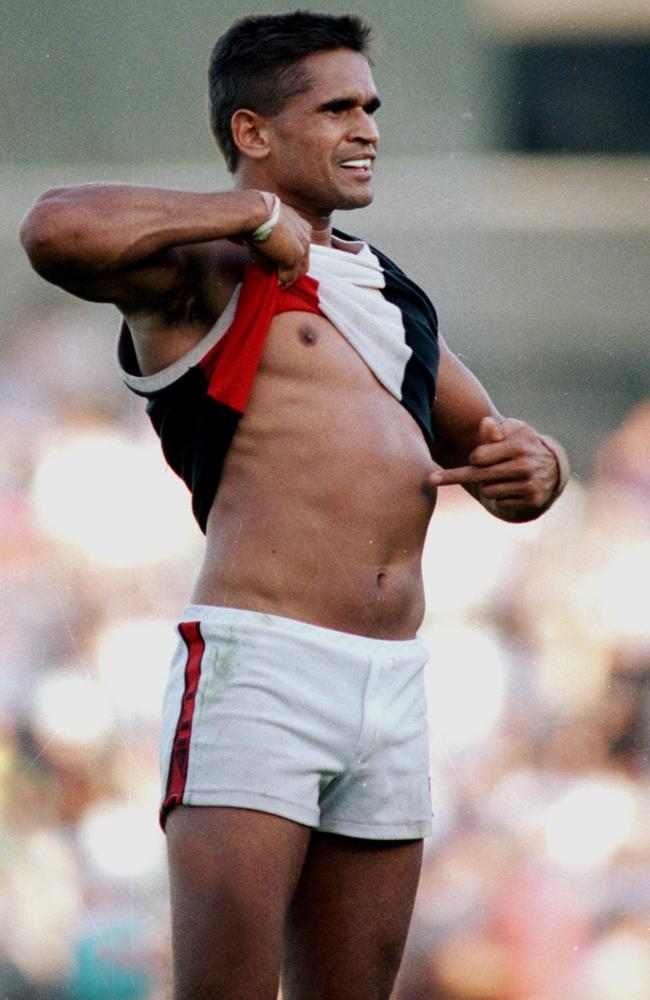
Winmar played A grade aged 15 and admits he felt, through his early school days through the 1970s, he had a higher level of talent than the other kids.
“When we were kids, we used to run around a lot,’’ he said.
“Not like today, they sit on their phones or play Nintendo, or sit in front of the TV. We were always out. We had nothing like that. We gathered in packs of family members, like kids running around kicking footies, making up footy ovals, putting up goals.’’
He was a North Melbourne supporter and loved Keith Greg and Malcolm Blight, and like every young boy and girl throughout that period, was devoted to The Winners on the ABC on Sunday arvo.
To a young lad, Victoria felt as distant as “Peru or Brazil, or playing for Liverpool’’.
“I had a lot of cousins who were great footy players and a lot of them didn’t journey the distance that I did. Dad sort of knew I would go further with it,” he said.
“He made me train differently to other family members. There was a lot more running. He always said the more mileage the better. Sometimes, he’d work Saturdays for half a day and make me go out to the sheds and do some shearing with him at the age of 14.’’
It was here, he said, where he sharpened his footy skills, not the ball handling, but the strength in the legs and arms.
“There’s a lot of twisting and turning in shearing, it’s not just standing in one spot,’’ he said. “You’ve got to bend, twist and turn, all your body is moving.
“You know, Rocky Balboa, he chased a chook.’’
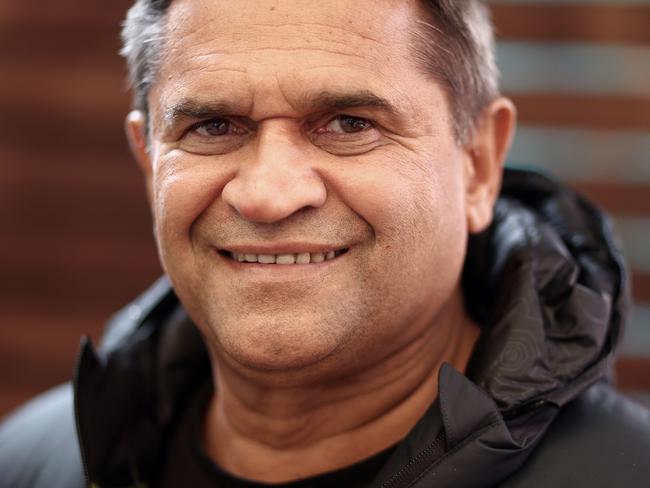
With that he smiled.
“I had a good name too, my second name is Elvis, and I used to love dancing. You now, they’ve got to put dancing into footy clubs, one day a week they should just dance. You get your hips moving and feet. I used to dance a lot when I was younger.’’
OK, where did you learn to kick the torpedo?
“A lot of practice . Blighty used to do them, I used to watch him.’’
And the speccy?
“We lost a few trees around the yard, because we used to leap off the stump. We’d run, put our feet on the stump, launch and then land on the back and shoulders of someone standing in front. We’d throw the ball and run and jump on a cousin or brother.’’
The tackling?
“The pens were full of sheep, so we had to grab them. My old man said no matter how many sheep you’ve got, the last sheep was always the fittest and he always wanted to know where all his mates had gone. Dad put me in the pen to tackle the sheep.
“You now, we (Indigenous players) like to tackle a lot because it was more about trying to get the ball out of their arms, and then the footy was out and we’d go after it’’
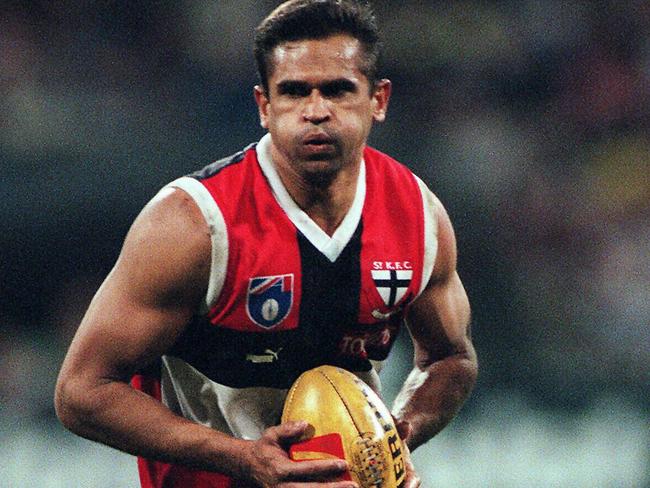
The evasiveness?
“You had to do everything quickly because you knew the next person was going to come and get you. You had to make sure there was distance between you and where your last tackle was, because the next person was coming at you at 100 miles an hour. It’s like a cheetah going towards an antelope, and if the antelope gets dragged down and then was lucky enough to get up and get away, it had to move quick.’’
Asking a player such as Winmar to describe playing football is akin to asking a big-wave rider how to surf.
There’s an instinct and feel which can’t be adequately relayed.
“When we played, we had the skill to do different, other things,’’ Winmar said.
“We sort of knew which way we were going to go and who was going to get it next.’’
From Pingelly to the big smoke
South Fremantle coach Mal Brown loved Nicky Winmar.
He saw him play for Pingelly and enticed him to the city and Winmar made his debut in the 1983 season, aged 17.
After four years, the VFL beckoned for the stylish wingman/half-forward.
“Mal Brown was very strong for me, telling me to stick around and not do this and not to do that,’’ Winmar said.
“Yeah, there were a few dramas there. I was home sick a lot.’’
Almost an Essendon player — he had lunch with Kevin Sheedy one day, but Winmar says the Bombers picked Tony Antrobus instead — Winmar landed at St Kilda largely through the efforts of legendary Indigenous recruiter John King.
King flew to Perth and then flew Winmar back to Melbourne — the plane tickets were under Mr and Mrs King — to avoid the clutches of the competition’s new arrivals, the West Coast Eagles.
“It was after my 21st birthday, I jumped on the plane and flew to Melbourne,’’ Winmar said.
He phoned his folks on arrival and they asked him what time he was going to be home for dinner — because he didn’t tell them he had flown to Melbourne.
“Mum said, what are you doing, and dad said, stay there son, stay there.’’
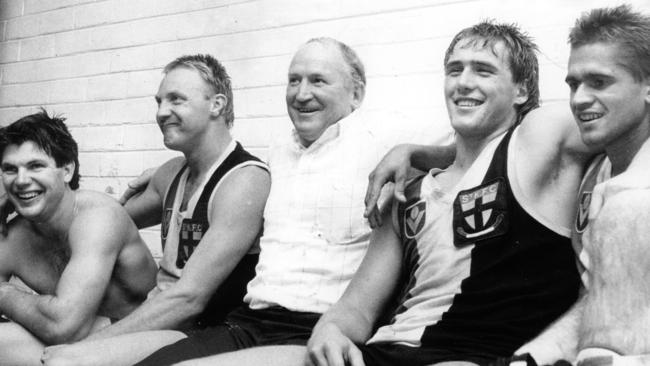
And so began a wonderful 251-game VFL/AFL career.
Darrel Baldock was his first coach.
“He was amazing. He got something out of us. Baldock gave us a lot of belief, to me and to the players who were there before I got there and we stated winning games,” Winmar said.
He had three coaches — Baldock, Ken Sheldon and Stan Alves — and probably played his best season — 1995 — under Alves, when he won the club B & F and his second All Australian blazer.
“You know, I can’t say I played every game to my full potential, I was beaten a lot of times, but I knew the next time I played them it was going to be different,’’ Winmar said.
His best game?
“Had a few of them,’’ he laughed.
In one period in 1989, when great mate Tony Lockett was out of the side, Winmar was moved from half-forward to full-forward.
In a four-week spell, he kicked 3.3, 8.1, 9.3 and 3.5.
Winmar’s career — and life — wasn’t without dramas, yet being on a footy field was a sort of safe place for him.
“It was just footy,’’ he said. “It was away from everything and everyone and life. It’s a totally different place altogether. It’s just there. And you’ve worked hard to get yourself there. You know, the journey was a long journey, from my hometown to Moorabbin. Footy was a place where you could be strong, stand tall and be safe. You can get hurt and that’s part of the game, but you’ve got your teammates around, you’ve got your mates around you, you look after each other, which is so good.’’
Winmar is elevated to the Australian rules Hall of Fame, not because he lifted his jumper and pointed to his black skin on a torrid racists day at Victoria Park. No, but his contribution to cultural change in regards to racism leaves a mark on the game perhaps even greater than his playing career.
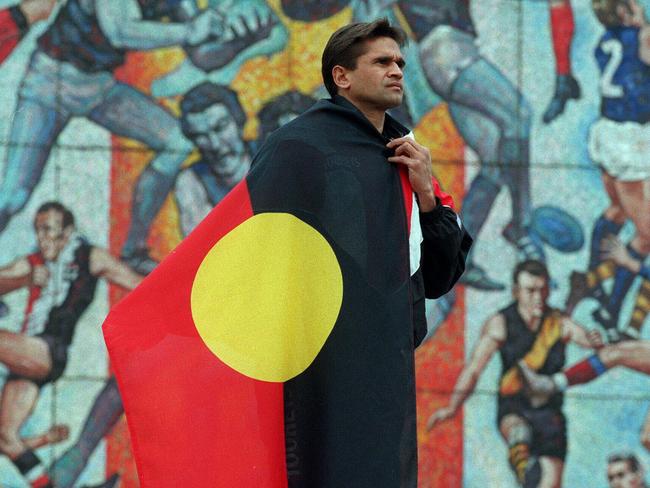
It’s true, he played like a prince but is remembered as a king.
“I played a lot of footy to make my dad happy and see him proud, and my mum. There was a lot of racism back in town years ago, in Western Australia, and in Pingelly,’’ he said.
“Growing up, we’d go from campsite to campsite, as dad used to do. His first vehicle to get to the shearing shed was a horse and cart. We moved campsite to another site because it would be all taken from us by the government. It wasn’t very nice. We weren’t allowed to go into town after 6pm, otherwise we’d get locked up or taken away.’’
He learned to put up with racism. “We did, always did,’’ he said.
But in the AFL, life changed.
His most famous incident, which is now a statue at Perth’s Optus Stadium, was to stand up against Collingwood’s crowd that day. There were countless others. Like the day in 1990, when Dermott Brereton racially abused him and Winmar was suspended for 10 weeks for kicking and eye-gouging Brereton.
Did you do it? “Not really, I was trying to get him off me … it was like wrestling a sheep,’’ he said with a laugh.
And the kicking? “Only in the side of the leg.’’
Brereton later wrote an article about how ashamed he was of what he said. And Winmar forgave the Hawks champ.
“I see Dermy now, shake his hand, say hello,’’ Winmar said. “He came out in the paper and apologised and people read that. I’m proud of Dermott for doing that.’’
He says he will never tire of talking about racism — “It’s always going to be part of us, it’s always there, it’s pretty hurtful,’’ he said — and is moved when fathers in the street with their kids stop and talk to him.
“These people, the fathers, they grew up through racism and they saw it, and now they’re telling their kids to do the right thing, it’s good,’’ Winmar said.
Now 56, Winmar is fit, having given up drinking and gambling, and wanted to talk about his oldest grandchild playing footy in Ballarat more than he wanted to talk about himself. “You should see him play,’’ he said, “I was up there last week, he kicked a couple of goals. I loved watching him.’’
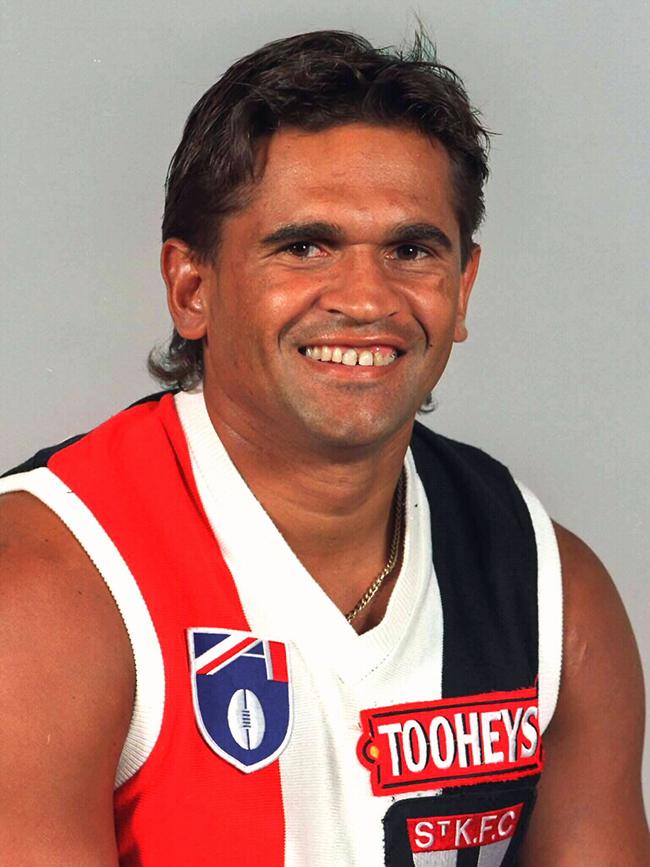
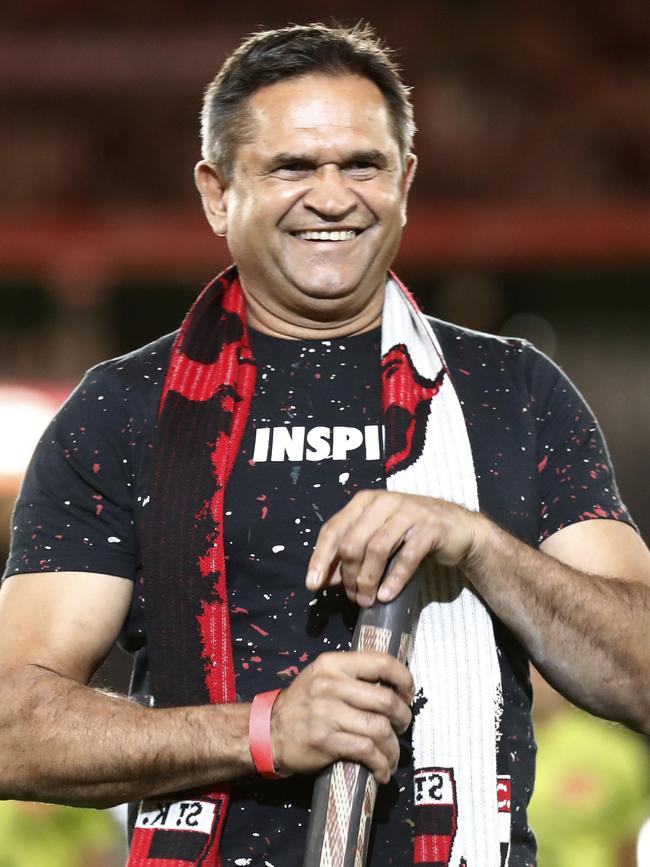
Family now is everything, although mum and dad have gone.
Dad died the day before the 1997 Grand Final between St Kilda and Adelaide.
“I spoke to mum, and mum’s gone now too, but I spoke to mum and said if anything happens, don’t call me. I’d rather think he was still alive. But she rang up that morning,’’ Winmar said. “I tried to picture him still here, still alive, but it was tough. During the game I wasn’t there, I was lost. My birthday was the 25th, dad died the 26th and the Grand Final was the 27th.’’
Winmar’s AFL footy career spanned from 1987-1999 and after that, he returned to Western Australia.
“It didn’t work,’’ he said. He met a friend, Beth, and they travelled, and were together for nearly 20 years before they split through the Covid period.
This day, he wanted to thank everyone who helped him, in footy and in life, which he described as “having its moments’’, especially his former wife Kelly.
“I’m just proud to be part of all the Indigenous players in the Hall of Fame,’’ he said. “I’m happy for my Indigenous people and for mum and dad.”
He says he doesn’t want to be remembered for being a cultural icon.
“I’m just a kid from Pingelly that followed a dream and it came true,’’ he said.
Originally published as St Kilda legend Nicky Winmar inducted into Australian Football Hall of Fame





